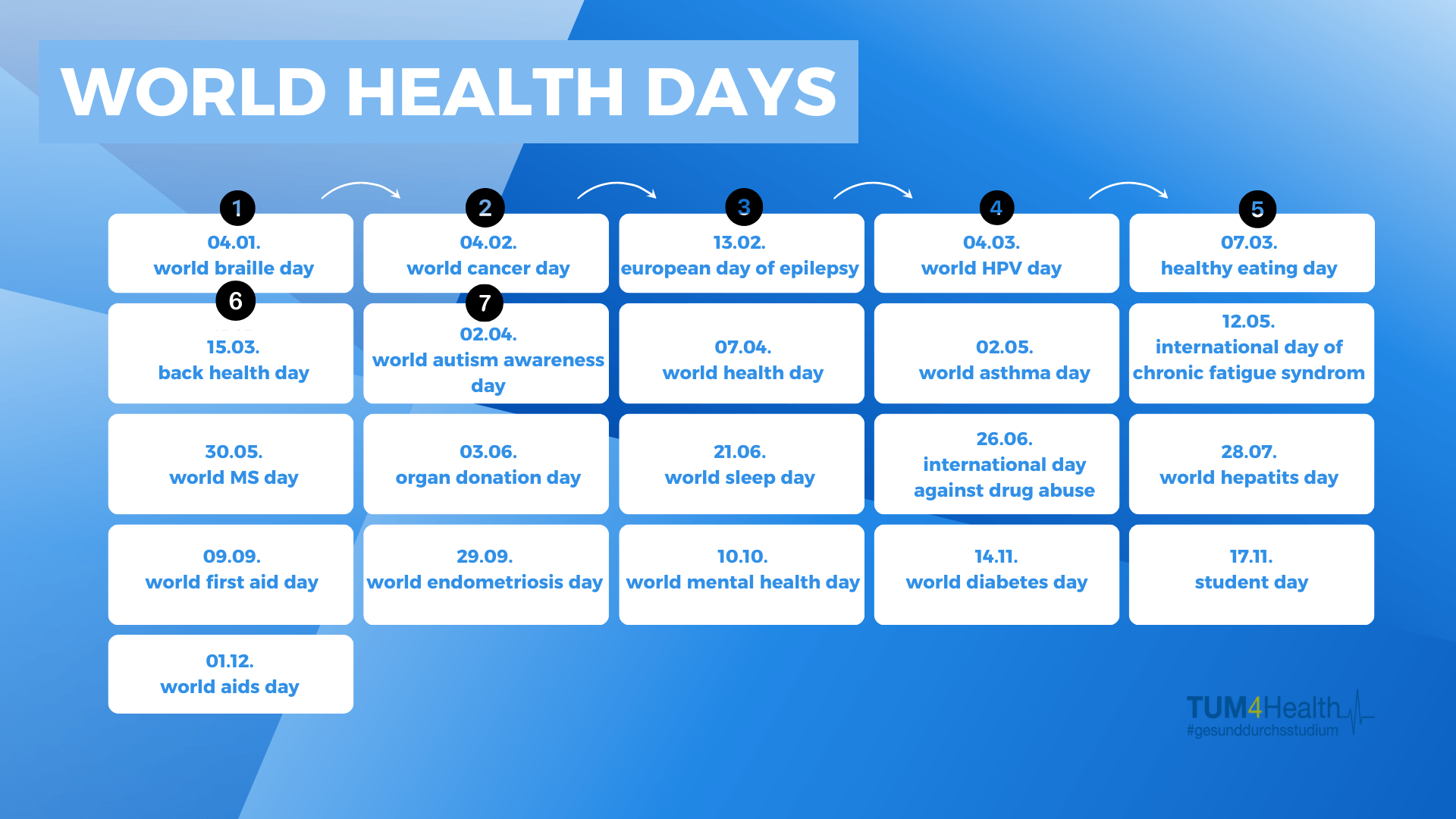World Health Days
A project by students for students! On this page we introduce you to a series of well-known and lesser-known World Health Days. Students explain the background to World Health Days and provide you with the most important information. You will also find helpful links on how you can get actively involved!
January
-
January 4th: World Braille Day
World Braille Day takes place on January 4th. Braille is used internationally as Braille and is available in almost all languages in the world. The day is held on the birthday of the inventor of Braille, Louis Braille. He invented Braille at the age of 16.
February
-
February 4th: World Cancer Day
In Germany alone, around 500,000 people develop cancer every year and around 4.65 million live with a cancer diagnosis in this country. The medical, psychological and economic consequences are immense. The good news, however, is that therapeutic solutions, especially when it comes to pharmaceuticals, are constantly improving. The likelihood of some cancers can be reduced preventively. If one assumes that around 40% of all cancers can be prevented through a healthy lifestyle and other strategies such as preventive examinations, there is a very large primary prevention potential here. But it is important to create awareness.
-
February 13th: European Epilepsy Day
Epilepsy is one of the most common neurological diseases. There are different forms and syndromes that are associated with different symptoms and prognoses.
March
-
March 4th: World HPV Day
The abbreviation HPV stands for human papilloma virus. A total of 200 HPV viruses are known. These pathogens are sexually transmitted and can lead to changes in the cells if an infection is present. This can lead to cancer. This primarily occurs on the cervix in women. This can also affect men in the anus or penis, as well as in the mouth and throat. World HPV Day takes place on March 4th and is primarily intended to educate people about the disease but also how to prevent it through vaccination. Vaccination reduces the risk of cancer by protecting against the most dangerous types of HPV. However, it is important that the vaccination takes place before the first sexual contact and that there is vaccination protection. The STIKO recommends vaccination especially for girls between the ages of 9 and 14. Every girl should get vaccinated before her 18th birthday. Since 2018, the vaccination has also been recommended for boys. Almost all women and men become infected at some point in their lives, most often by the age of 25. However, the majority of infections go unnoticed and without any signs of illness. As a rule, the infection clears up on its own in 90% of cases. But if the body fails to fight off the infection, some types of HPV can cause genital warts, for example, or cause changes in the cells that can result in cancer. This can lead to cervical cancer. Every year, 4,600 women in Germany develop cervical cancer and 1,500 die from it every year.
-
March 7th: World Healthy Eating Day
We all know it: in everyday student life, healthy and regular meals are sometimes neglected. Meanwhile, healthy eating, along with regular exercise, restful sleep and preventive medical check-ups, is one of the most important pillars of a healthy lifestyle. It is very important to us to create awareness and point out the great importance of the topic.
-
March 15th: Back Health Day
Most of a student's day takes place in one position: sitting at the desk, hunched over in front of the books or the computer. On average, TUM students spent 9.5 hours on a weekday doing sedentary activities. 48.3% complained of limb, shoulder, back or neck pain. To compensate for this, active back health should be strengthened. These types of problems can be managed by yourself if you actively do something about them.
April
-
April 2nd: World Autism Day
The word autism - more precisely the autism spectrum disorders - is a collective term for developmental disorders that affect interpersonal relationships, language, verbal and non-verbal communication, interests or behavior patterns. The developmental disorders and their manifestations begin at birth or in early childhood and persist throughout life.
-
April 7th: World Health Day
World Health Day was established by the WHO, the World Health Organization, in 1954 and takes place annually on April 7th. This day commemorates the founding of the World Health Organization in 1948.
May
-
02 May: World Asthma Day
Bronchial asthma is a chronic inflammatory disease of the respiratory tract that can occur at any age and, according to WHO figures, around 235 million people suffer from it worldwide. According to the RKI, when comparing federal states in Germany, the prevalence of asthma varies between 3.0% - 9.7% in women and 2.9% - 7.0% in men. Nevertheless, every tenth child in Germany is ill. For this reason, May 2nd every year has been declared as World Asthma Day to raise awareness.
-
May 12: World Chronic Fatigue Syndrome Day
We all know it well: the exams are coming up, the thesis has to be written, work is calling and you shouldn't completely ignore your private life. You are close to more or less severe exhaustion. But in addition to the completely normal exhaustion, which is probably familiar to almost everyone, there is also a clinical picture that has physical and psychological exhaustion as its main symptoms. The disease manifests itself in a prolonged state of exhaustion that exceeds the usual level and for which there is no clear explanation. We are talking about chronic fatigue syndrome (also known as Chronic Fatigue Syndrome/CFS) or myalgic encephalomyelitis (ME).
-
May 30: World MS Day
MS is the nerve disease multiple sclerosis. It is the most common chronic inflammatory disease of the central nervous system in young adults. Most patients are between 20 and 40 years old. As of 2019, around 240,000 people in Germany are suffering from it, over 70% of whom are female.
June
-
June 3rd: Organ Donation Day
Organ Donation Day takes place on the first Saturday in June. There are currently over 9,000 people waiting for a donor organ in Germany alone. On average, people wait over 6 years for a donation to materialize. There is no age limit for organ donation, but you should be at least 16 years old to carry an organ donor card. The doctors decide on the suitability of the organs. However, the prerequisites are irreversible brain function loss as determined according to the guidelines of the German Medical Association and consent to organ donation. The consent can, for example, be a written declaration of consent in the form of an organ donor card or a living will. It can also be carried out by the relatives afterwards, who implement the wishes of the deceased. Organs that can be donated include the heart, lungs, kidneys, liver, pancreas and intestines. Kidneys in particular are the most urgently needed. The ID card is small and handy and can be kept in your wallet. It can be filled out alone at home; a doctor's consultation is not necessary, but can be done if you wish. It contains the most important personal data, as well as a decision or objection to organ donation after death. Furthermore, individual organs can be excluded from donation. It is not possible to select the donor, for example by age or gender. You can download your organ donation card here: Your organ donation card!
-
June 21st: Day of Sleep
Sleep is essential for our body to function optimally and for maintaining our physical and mental health. Based on the average age at death, we sleep around 1/3 of our lives. Most people sleep around 7 to 8 hours per day, although each of us has our own individual sleep schedule. The following applies: If you don't get tired despite sitting for long periods of time during the day, you've gotten enough sleep at night.
-
June 26: World Drug Day
This day is intended to remind us that drugs are a major individual and social problem. But what exactly are we talking about when we talk about drugs?
July
-
July 28: World Hepatitis Day
World Hepatitis Day takes place annually on July 28th, the birthday of Baruch Samuel Blumberg. In 1965, he was the first to discover a protein from the pathogen hepatitis B. Hepatitis infections are generally easy to treat. However, regular medical examinations are necessary as the infections often remain undetected for several years and can lead to serious damage to the body, such as cirrhosis or liver cancer. Hepatitis B disease in particular often manifests itself after one to six months with flu-like symptoms and fatigue. All German citizens aged 35 and over are entitled to a free hepatitis B and C test. The examination can, for example, be carried out by your family doctor. Worldwide, 296 million people are affected by chronic hepatitis B and 58 million people suffer from chronic hepatitis C. The disease is primarily transmitted via body fluids, which is why many changing sexual partners pose a risk of hepatitis disease.
September
-
September 9th: First Aid Day
Saving lives can be easy. It is important to know what to do with an injured person in the event of an accident or serious incident if you are the first on the scene.
-
September 29: Endometriosis Day
September 29th is Endometriosis Day. Did you know that around 10 years pass between the manifestation of the first symptoms and the diagnosis? But what actually is endometriosis?
October
-
10. Oktober: World Mental Health Day
October 10th is World Mental Health Day.
November
-
November 14th: World Diabetes Day
World Diabetes Day officially takes place annually on November 14th and is a recognized health day by the United Nations. The day takes place on the birthday of the discoverer of the hormone insulin, Frederick G. Banting. He discovered the vital hormone in 1921. The symbol of unity in the fight against diabetes is a blue circle. Similar to World Health Day, World Diabetes Day also has a new motto every year. Topics in recent years have included diabetes and obesity (2004), women and diabetes (2017) and family and diabetes (2018).
-
November 17th: Student Day
Today is Students' Day or, somewhat more anciently, known as "World Students' Day". Many people will be surprised at this point, but it really exists: a day dedicated to us students!
December
-
December 1st: World AIDS Day
An infection with the HIV virus (Human Immunodeficiency Virus) leads to damage and destruction of immune cells, making the body more susceptible to illness. Without treatment, this can lead to acquired immune deficiency syndrome, AIDS (Acquired Immunodeficiency Syndrome). World AIDS Day is intended to strengthen the rights of HIV-positive people and call for coexistence without prejudice and exclusion. He also remembers the people who died as a result.




